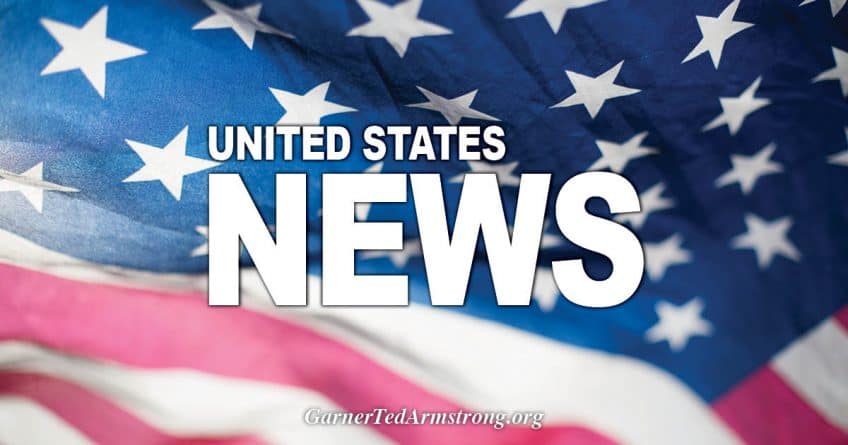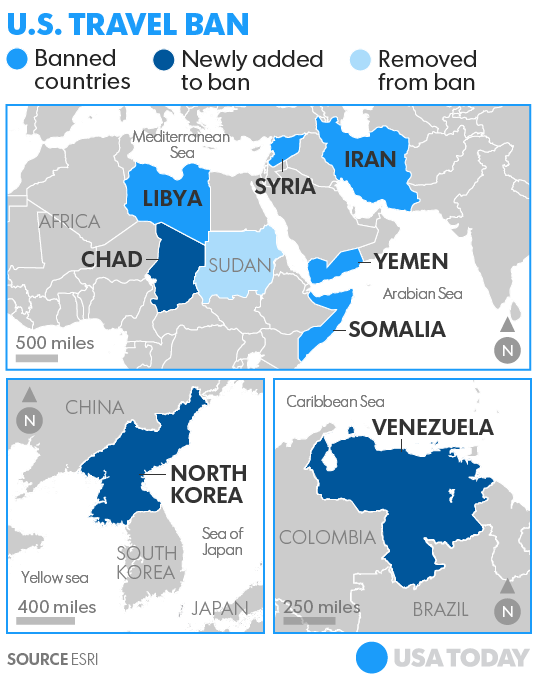Just hours before President Trump’s third attempt at a travel ban targeting majority-Muslim nations was scheduled to go into effect Wednesday, federal judges in Maryland and Hawaii again shut down the controversial measure.
In Maryland, U.S. District Judge Theodore Chuang ruled late Tuesday that the travel ban continues to have the same problems, and violate the same constitutional principles, as previous versions of the ban. Despite tweaks made by the administration, Chuang ruled that it still constituted a “Muslim ban” that violates the Constitution’s protections against religious discrimination.
Earlier in the day in Hawaii, U.S. District Judge Derrick Watson struck down the ban on different grounds, arguing it violates a federal law that prohibits discrimination based on nationality. Watson said Trump overstepped his legal authority by banning 150 million people from countries targeted in the ban, and that the law does not give him “unbridled discretion to do as he pleases.”
The two rulings combined provide opponents of the ban with multiple legal attacks as the cases make their way through the appeals process.
“They demonstrate the breathe of legal problems that the administration is facing as it tries again and again to impose the ban,” said Omar Jadwat, an ACLU attorney involved in the Maryland case. “They really undermine how any way you look at it, they lose.”
The White House insists that will not be the case. Both judges who ruled Tuesday were appointed by former president Barack Obama. And for all the legal wrangling over the travel ban during the past nine months, the Supreme Court has not yet fully weighed in.
When it does, the high court will have Trump’s nominee — Justice Neil Gorsuch — on the bench, meaning the more conservative court could end up saving the travel ban for Trump.
White House press secretary Sarah Huckabee Sanders said Tuesday that she was, “confident that the judiciary will ultimately uphold the president’s lawful and necessary action and swiftly restore its vital protections for the safety of the American people.”
At issue is Trump’s third attempt to implement a travel ban set to begin Wednesday. The ban would block specific travelers from five of the original nations cited in Trump’s first ban issued in January — Iran, Libya, Somalia, Syria and Yemen — along with Chad, North Korea and Venezuela.
Iraq and Sudan were subtracted from the list in March and September, respectively.
Watson, issuing a nationwide block against the travel ban, said the measure was “simultaneously overbroad and underinclusive” because it targets entire countries rather than dangerous individuals. Watson ruled the new ban fails to show that nationality alone makes a person a greater security risk to the U.S.
“The categorical restrictions on entire populations of men, women and children, based upon nationality, are a poor fit for the issues regarding the sharing of ‘public-safety and terrorism-related information’ that the president identifies,” Watson wrote.
Watson’s ruling affects only the six majority-Muslim countries and does not include North Korea and Venezuela. But few people are affected by the ban in those countries.
More: Federal judge in Hawaii blocks Trump’s third travel ban
More: New travel ban adds North Korea, Venezuela
More: In victory for Trump, Supreme Court dismisses travel ban case
Chuang, in his ruling a few hours later, said the president’s own words make clear the focus is not on national security but on instituting a ban against Muslims. The judge said the administration had “not shown that national security cannot be maintained without an unprecedented eight-country travel ban.”
Chuang’s ruling was more limited. It prohibits the administration from enforcing the ban against people who can prove they have a “bona fide” — or good faith — relationship with U.S. persons or entities, such as businesses or universities.
In using that wording, the judge followed guidance from the Supreme Court over the summer, when it allowed the Trump administration to implement a scaled-back version of an earlier travel ban. The court dismissed that case after Trump issued the latest version.
The Trump administration continues defending the ban, arguing that a president has broad authority to restrict immigration in the name of national security.
The administration points to a section of federal law that allows a president to bar admission to “any aliens or of any class of alien” that he declares are “detrimental to the interests of the United States.” And it says the latest version of the travel ban is a carefully constructed measure implemented after a thorough review by the departments of Homeland Security, State, Defense and Justice.
The Justice Department has said it will appeal Watson’s ruling.
[Disclaimer]







